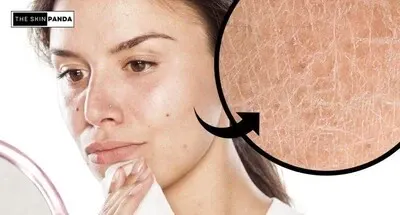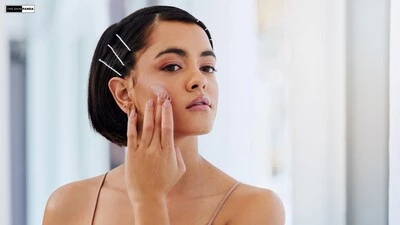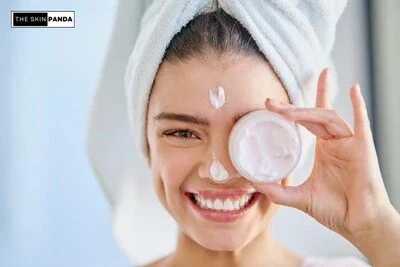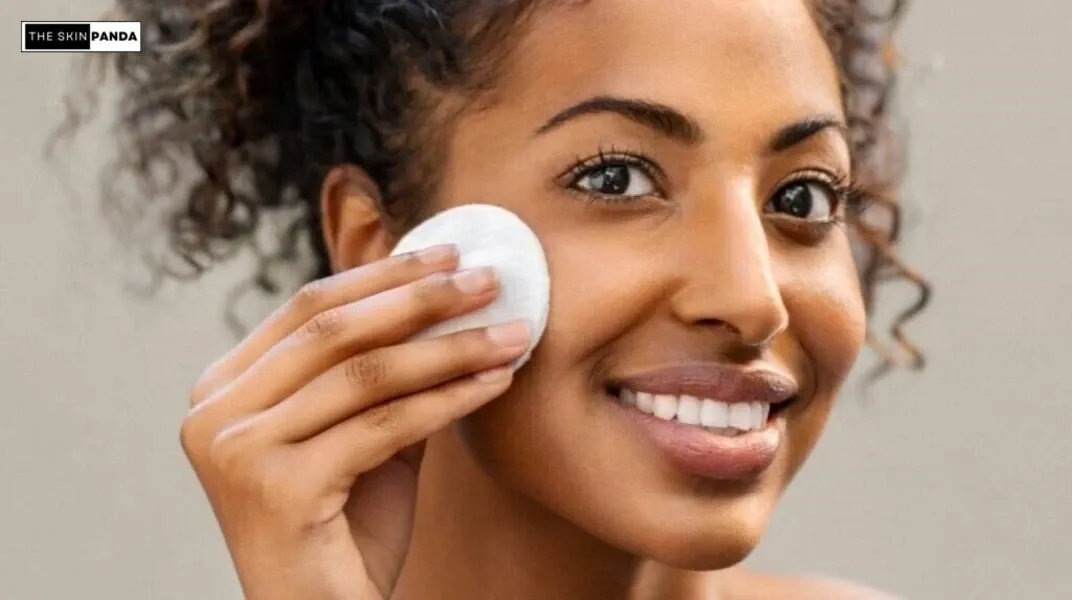Is makeup bad for your skin? It’s a question that sparks curiosity and concern alike. As you navigate the realm of beauty and skincare, join us in uncovering the truth about makeup’s effects on your skin. Continue reading below to explore the myths, facts, and expert insights that shed light on this intriguing topic.
In a world where appearance holds immense importance, makeup has become a ubiquitous tool for enhancing beauty and expressing individuality.
From a touch of mascara to a full-face makeover, makeup allows us to transform our appearance and boost our self-confidence.
However, alongside the allure of flawless skin and striking features, concerns about the potential negative effects of makeup on skin health have been steadily growing. The question lingers: Is makeup truly bad for your skin?
As the beauty industry continues to evolve and new products flood the market, it’s crucial to separate fact from fiction and gain a deeper understanding of how makeup interacts with our skin.
In this article, we delve into the intricate relationship between makeup and skin health, examining both the potential drawbacks and the benefits that makeup can offer.
By shedding light on this multifaceted issue, we aim to provide you with the insights you need to make well-informed decisions about your makeup routine and overall skin care.
Understanding Is Makeup Bad For Your Skin
Unraveling the Interaction of Makeup and Skin Health
Makeup products are the tools that allow us to express our creativity, enhance our features, and achieve the desired look.
These products are meticulously formulated using a combination of ingredients that serve various functions.
Understanding the composition of makeup is essential for evaluating its potential impact on skin health.
Different Types of Makeup:
There is a diverse array of makeup products available, each designed to address specific cosmetic needs. From foundation and concealer to blush and highlighter, different types of makeup serve distinct purposes in achieving a desired appearance.
Foundation: Often considered the base of any makeup routine, the foundation helps create an even skin tone by covering blemishes, redness, and uneven pigmentation.
Concealer: This product is designed to camouflage imperfections such as dark circles, acne scars, and redness, providing a more flawless complexion.
Powder: Setting powders help reduce shine and lock makeup in place, ensuring a matte finish and extended wear.
Blush and Bronzer: Blush adds a healthy flush of color to the cheeks, while bronzer provides a sun-kissed glow and enhances facial contours.
Eyeshadow and Eyeliner: Eyeshadows come in various shades and textures, allowing for creative eye looks. Eyeliners define the eyes and create different effects, from subtle to dramatic.
Lipstick and Lip Gloss: Lip products come in various colors and finishes, adding vibrancy and dimension to the lips.
Mascara: Mascara enhances eyelashes by lengthening, volumizing, and defining them.
Setting Spray: A mist that helps set makeup, ensuring its longevity and reducing the need for touch-ups.
Each makeup product consists of a specific formulation tailored to its function. Understanding these products and their composition is crucial for assessing their potential impact on skin health.
Ingredients Commonly Found in Makeup:
The allure of makeup lies not only in its ability to enhance beauty but also in the intricate chemistry of its ingredients.
However, the cocktail of compounds used in makeup can have varied effects on the skin, ranging from positive to potentially detrimental.
Here are some common ingredients found in makeup and their potential effects on the skin:
1. Fragrances and Allergens: Fragrances are often added to makeup products to provide a pleasant scent. However, they can lead to skin irritation and allergies, particularly for those with sensitive skin. Unscented or fragrance-free options are advisable for individuals prone to skin reactions.
2. Parabens and Preservatives: Parabens are commonly used as preservatives to extend the shelf life of makeup products. Yet, concerns have arisen due to their potential to mimic estrogen and disrupt hormonal balance. Opting for paraben-free products can mitigate these concerns.
3. Mineral Oils and Comedogenicity: Mineral oils are derived from petroleum and are found in various makeup formulations. However, they have a higher likelihood of clogging pores, leading to acne breakouts, particularly in individuals with oily or acne-prone skin.
4. Titanium Dioxide and Zinc Oxide: These ingredients are often found in sunscreens and certain foundations for their sun-protective qualities. They create a physical barrier against UV rays, reducing the risk of sun damage.
5. Silicones: Silicones are used to create a smooth texture in makeup products, aiding in application and longevity. They can temporarily blur imperfections but might not suit all skin types and can contribute to clogged pores in some cases.
6. Retinyl Palmitate and Vitamin A Derivatives: These compounds are sometimes added for their potential anti-aging effects. However, they can increase skin sensitivity to sunlight and may not be suitable for everyone.
7. Talc: Talc is commonly used in powders for its absorbent properties. While considered safe, there have been concerns about its potential link to certain health issues, prompting some brands to formulate talc-free products.
The Effects of Makeup on Skin Health

The canvas of our skin is both delicate and resilient, making it important to consider the potential impact of makeup on its health and appearance.
While makeup can be a powerful tool for enhancing beauty and expressing individuality, it’s essential to be aware of both its positive and negative effects on the skin.
Potential Negative Effects
1. Clogged Pores and Acne Development: Makeup, especially heavy formulations like liquid foundations, can clog pores and trap dirt and bacteria. This can lead to the development of acne, blackheads, and whiteheads, particularly in individuals with oily or acne-prone skin.
2. Skin Irritation and Allergies: Some makeup products contain fragrances, preservatives, and other additives that can trigger skin irritation, redness, and allergic reactions. Individuals with sensitive skin are particularly susceptible to these adverse effects.
3. Premature Aging due to Free Radicals: Certain makeup ingredients, like free radical-generating pigments, can contribute to oxidative stress, which accelerates the aging process. This might lead to the appearance of fine lines, wrinkles, and uneven skin tone over time.
Factors Influencing Effects
1. Skin Type and Sensitivity: Different skin types react differently to makeup. Those with dry skin might experience flaking or irritation, while oily skin types may be more prone to breakouts.
2. Quality of Makeup Products: The formulation and quality of makeup products play a significant role in their effects on the skin. Low-quality or expired products are more likely to cause adverse reactions.
3. Proper Makeup Removal Techniques: Failing to remove makeup thoroughly before bedtime can contribute to the accumulation of makeup residue, oils, and debris, leading to skin issues.
Balancing the desire for makeup-enhanced beauty with maintaining healthy skin requires a thoughtful approach.
While some individuals might consider going makeup-free to protect their skin, it’s important to address misconceptions and recognize that makeup doesn’t universally harm the skin.
Debunking Myths About Makeup and Skin

In the quest for radiant skin, there are numerous myths and misconceptions surrounding the use of makeup.
It’s crucial to separate fact from fiction to make informed decisions about our skincare routines. Let’s dispel some common myths associated with makeup and its impact on skin health:
1. Makeup is the Sole Cause of Skin Issues
- Myth: Makeup is solely responsible for skin problems like acne and irritation.
- Reality: While some makeup products can exacerbate certain skin issues, they are rarely the sole cause. Factors like genetics, hormonal fluctuations, diet, and skincare habits also play significant roles.
2. “Makeup-Free” Skin as Inherently Healthier
- Myth: Not wearing makeup automatically results in healthier skin.
- Reality: The absence of makeup doesn’t guarantee healthy skin. Proper skincare habits, including cleansing, moisturizing, and sun protection, are crucial regardless of whether makeup is used.
3. Makeup as a One-Size-Fits-All Issue
- Myth: The effects of makeup are the same for everyone.
- Reality: Makeup’s impact on the skin varies widely based on individual factors such as skin type, sensitivity, and the quality of products used. What works for one person may not work for another.
4. All Makeup Ingredients are Harmful
- Myth: All makeup ingredients are harmful or toxic.
- Reality: While some makeup ingredients can be problematic for certain individuals, many products are formulated with skin-friendly ingredients. Understanding ingredient labels and choosing wisely can help mitigate potential risks.
5. Makeup Can’t Contribute to Skin Improvement
- Myth: Makeup is purely cosmetic and cannot contribute to skincare goals.
- Reality: Some makeup products incorporate skincare ingredients like hyaluronic acid, antioxidants, and SPF, which can offer added benefits such as hydration, protection, and anti-aging effects.
6. Going Makeup-Free is the Only Solution
- Myth: To have healthy skin, one must avoid wearing makeup altogether.
- Reality: Wearing makeup in moderation and following a proper skincare routine can coexist harmoniously. It’s about making thoughtful choices and practicing good skincare habits.
By debunking these myths, we gain a clearer understanding of the complexities of makeup’s effects on the skin.
It’s important to approach makeup as a tool that, when used mindfully and in conjunction with proper skincare practices, can contribute to both self-expression and skin health.
How to Maintain Healthy Skin while Using Makeup

Maintaining healthy skin while enjoying the benefits of makeup requires a balanced approach that combines informed product choices, proper application, and diligent skincare practices.
Here are practical tips to help you use makeup without compromising your skin’s well-being:
A. Choose Makeup Products Wisely
1. Opt for Non-Comedogenic Formulas: Look for products labeled as non-comedogenic, which are less likely to clog pores and cause breakouts.
2. Go Dermatologist-Tested: Products that have been dermatologist-tested are generally safer for sensitive skin and less likely to trigger adverse reactions.
3. Avoid Harsh Chemicals: Steer clear of makeup products that contain harsh chemicals, fragrances, and allergens that could irritate the skin.
B. Practice Proper Skincare Routine
1. Cleanse Thoroughly: Before applying makeup, start with a clean canvas by gently cleansing your face to remove dirt, oil, and debris.
2. Remove Makeup Before Bed: Never sleep with makeup on. Use a gentle makeup remover or cleansing oil to ensure thorough removal before bedtime.
3. Regular Exfoliation and Moisturization: Incorporate exfoliation to remove dead skin cells and moisturize to keep your skin hydrated and balanced.
C. Allow Your Skin to Breathe
1. Go Makeup-Free on Occasion: Give your skin a break by having makeup-free days, allowing it to recover and breathe naturally.
2. Minimize Heavy Makeup for Daily Use: Reserve heavier makeup looks for special occasions, and opt for lighter, breathable formulations for everyday wear.
3. Invest in Quality Makeup Brushes: Quality brushes and applicators can help create a smoother application and reduce the need for excessive product use.
By following these tips, you can strike a balance between expressing your personal style through makeup and prioritizing your skin’s health.
Keep in mind that individual skin reactions may vary, so be attentive to how your skin responds to different products and adjust your routine accordingly.
Tips on How to Practice Proper Skincare Routine

The path to harmonizing makeup and skin health begins with thoughtful product selection. Making informed choices about the makeup products you use can have a significant impact on the well-being of your skin. Here’s how to choose makeup products wisely:
1. Opt for Non-Comedogenic Formulas: Non-comedogenic products are designed not to clog pores or promote the formation of acne. Look for this label on foundations, primers, and other complexion products.
2. Prioritize Dermatologist-Tested Products: Makeup that has been dermatologist-tested is less likely to cause irritation or adverse reactions, making it a safer option, especially for those with sensitive skin.
3. Avoid Harsh Chemicals and Fragrances: Harsh chemicals and fragrances can trigger skin sensitivities and allergies. Opt for products with minimal fragrance and avoid ingredients known to cause irritation.
4. Check for Hypoallergenic Claims: Hypoallergenic products are formulated to minimize the risk of allergic reactions. These can be suitable choices for individuals with skin sensitivities.
5. Research Product Ingredients: Take time to read ingredient lists and research any unfamiliar components. Look out for ingredients that might be problematic for your skin type.
6. Patch Test New Products: Before applying a new product all over your face, perform a patch test on a small area of skin to check for any adverse reactions.
7. Invest in Quality Brands: Established and reputable makeup brands often prioritize the quality and safety of their products. Investing in such brands can reduce the risk of negative skin effects.
8. Consider Your Skin Type: Choose makeup products that cater to your specific skin type—whether it’s oily, dry, combination, or sensitive to ensure compatibility.
Remember that makeup products interact differently with various skin types, so what works for one person might not work for another.
Experimenting with products and paying attention to how your skin responds can help you find the best makeup options for your individual needs.
Tips for Using Makeup Without Harming Your Skin

Achieving a harmonious relationship between makeup and skin health involves more than just selecting the right products.
Incorporating a diligent skincare routine can help maintain the vitality of your skin while enjoying the benefits of makeup. Here’s how to practice proper skincare alongside your makeup routine:
1. Cleanse Thoroughly: Before applying makeup, start with a clean canvas. Use a gentle cleanser to remove dirt, oil, and impurities from your skin.
2.. Remove Makeup Before Bed: Never go to bed with makeup on. Use a gentle makeup remover or cleansing oil to thoroughly remove all traces of makeup before sleeping.
3.. Exfoliation and Moisturization: Incorporate exfoliation into your routine to slough off dead skin cells and promote cell turnover. Follow up with a moisturizer to keep your skin hydrated and balanced.
4.. Use Sunscreen Daily: Apply a broad-spectrum sunscreen with at least SPF 30 as the final step in your morning routine, even if your makeup contains SPF. This offers added protection against UV rays.
5.. Use a Primer: Apply a makeup primer before your foundation to create a smooth base, help makeup last longer, and provide an additional barrier between your skin and makeup.
6. Choose Makeup Removers Wisely: Opt for gentle makeup removers that effectively dissolve makeup without stripping your skin of its natural oils.
7. Hydrate Inside and Out: Drink plenty of water to keep your skin hydrated from within, and consider using a hydrating mist throughout the day to refresh your makeup.
8. Maintain Consistency: Consistency is key to reaping the benefits of a skincare routine. Stick to your routine even on makeup-free days to keep your skin healthy.
9. Seek Professional Advice: If you have specific skin concerns, consult a dermatologist for personalized skincare recommendations that complement your makeup routine.
Balancing makeup and skincare requires a holistic approach that prioritizes the health and well-being of your skin.
By integrating proper skincare practices into your makeup routine, you can ensure that your skin remains radiant and resilient, allowing you to enjoy the creative expression that makeup offers.
Expert Insights: Dermatologists Take on Makeup and Skin Health

When it comes to understanding the delicate interplay between makeup and skin health, dermatologists offer invaluable insights.
These experts provide professional guidance on how to strike a balance between cosmetic expression and skin well-being:
Dr. Emily Johnson, Dermatologist:
“Makeup can be part of a healthy skincare routine, as long as you prioritize skin health. Opt for products labeled as non-comedogenic and avoid overloading your skin with heavy products. Regularly cleanse and moisturize to maintain a clean and hydrated canvas for makeup.”
Dr. Michael Patel, Cosmetic Dermatologist:
“Choosing quality over quantity is key. Invest in well-formulated products from reputable brands to minimize the risk of adverse reactions. Additionally, don’t forget the importance of makeup removal at the end of the day to allow your skin to breathe and regenerate.”
Dr. Sarah Lee, Dermatologist, and Beauty Expert:
“Makeup and skincare can go hand in hand when you prioritize sunscreen. Incorporating a broad-spectrum SPF under your makeup provides protection from UV rays. Also, consider using multitasking products that offer both cosmetic coverage and skincare benefits.”
Dr. Javier Rodriguez, Dermatologist:
“Individual skin reactions to makeup can vary greatly. Keep a diary of products you’ve used and how your skin reacts to them. This can help you identify any triggers and tailor your makeup choices to your skin’s unique needs.”
Dr. Lisa Chen, Clinical Dermatologist:
“Remember that less is often more. Light, breathable makeup options can reduce the risk of clogged pores and irritation. Regularly exfoliating and maintaining a consistent skincare routine can help mitigate potential negative effects of makeup.”
These expert insights highlight the significance of informed decision-making and proper skincare practices in the realm of makeup and skin health. While makeup offers a realm of creative possibilities, it’s crucial to prioritize your skin’s health and well-being above all else.
People Also Ask (FAQs)
Question 1. Is Makeup Actually Bad for Your Skin?
Answer: The answer isn’t black and white. While makeup can enhance your beauty, its impact depends on factors like product quality, skincare routine, and individual skin type. Prioritizing informed choices and proper skin care practices can help maintain a healthy balance between makeup and skin health.
Question 2. Is it Bad to Wear Makeup every day?
Answer: While makeup can be a powerful tool for self-expression, wearing it daily may lead to clogged pores, skin irritation, and potential long-term effects. Balancing makeup use with regular skincare and makeup-free days can help promote healthier skin.
Question 3. How Can I Look Good Without Makeup?
Answer: Embrace a healthy skincare routine that includes cleansing, moisturizing, and sun protection. Stay hydrated, get enough sleep, and nourish your skin from within with a balanced diet. Confidence, a genuine smile, and self-care can radiate a natural beauty that doesn’t rely on makeup.
Question 4. Does Leaving Makeup on Age Your Skin?
Answer: Yes, sleeping with makeup can contribute to premature aging. Makeup can clog pores, leading to breakouts and oxidative stress. Proper makeup removal and consistent skincare are key to maintaining youthful skin.
Question 5. What Happens if you don’t Wear Makeup?
Answer: Your skin can benefit from improved air circulation and reduced risk of clogged pores, leading to a healthier complexion. Embracing makeup-free days allows your skin to rejuvenate and maintain its natural balance. Prioritizing skincare and adopting a confident, natural look can enhance your overall beauty.
Question 6. How can I Look Attractive when I am not?
Answer: Focus on cultivating self-confidence and inner positivity. Embrace your unique features and showcase your personality through style and body language. Good grooming, a healthy lifestyle, and a genuine smile can enhance your attractiveness, reflecting inner beauty.
Question 7. Does Makeup Ruin Your Skin Over Time?
Answer: While makeup itself isn’t inherently damaging, improper usage and neglect of skin care can lead to potential issues. Regularly removing makeup, using quality products, and following a consistent skincare routine can help mitigate any negative effects, allowing you to enjoy makeup without harming your skin.
Question 8. Will Stopping Wearing Makeup Help My Skin?
Answer: Will stopping wearing makeup help my skin? Taking breaks from makeup can allow your skin to breathe and rejuvenate, reducing the risk of clogged pores and irritation. However, a comprehensive skincare routine tailored to your skin’s needs is equally important for maintaining healthy skin. Striking a balance between makeup use and skincare care can yield optimal results.
Question 9. Why is my Skin Better When I Wear Makeup?
Answer: Makeup can provide a temporary barrier against environmental pollutants and UV rays, helping protect your skin. Additionally, the confidence boost from wearing makeup can positively impact your self-esteem, which can reflect in your overall skin appearance. However, proper makeup removal and skincare remain crucial to sustaining skin health.
Conclusion
The journey through the world of makeup and its impact on skin health has revealed a nuanced relationship that requires careful consideration.
Makeup serves as a powerful tool for self-expression, creativity, and confidence, but its effects on the skin can vary widely based on individual factors, product quality, and skincare practices.
Above, we explored the composition of makeup products, delved into common ingredients and their potential effects on the skin, and examined the potential negative impacts of makeup, such as clogged pores, skin irritation, and premature aging.
By debunking myths surrounding makeup and skin, we highlighted the importance of a balanced perspective and individual variability.
We offered practical tips for using makeup without harming your skin, from choosing products wisely to practicing a proper skincare routine.
The importance of allowing your skin to breathe and rejuvenate was emphasized as a vital aspect of maintaining healthy skin while enjoying makeup.
Dermatologists’ expert insights underscored the significance of making informed choices and prioritizing skincare alongside cosmetic preferences.
By following their advice and adopting a holistic approach, you can enjoy the benefits of makeup while safeguarding the health and vitality of your skin.
As you navigate the world of makeup and its intricate relationship with skin health, remember that the key lies in understanding your skin’s unique characteristics, making informed decisions, and maintaining a consistent skincare routine. By doing so, you can achieve a harmonious balance between self-expression, aesthetic enhancement, and the well-being of your skin.
DISCLAIMER
The information provided in this article is for educational and informational purposes only. It is not intended as medical advice or a substitute for professional dermatological consultation. Individual skin reactions and needs vary; consult a qualified dermatologist or healthcare professional for personalized skincare recommendations.
